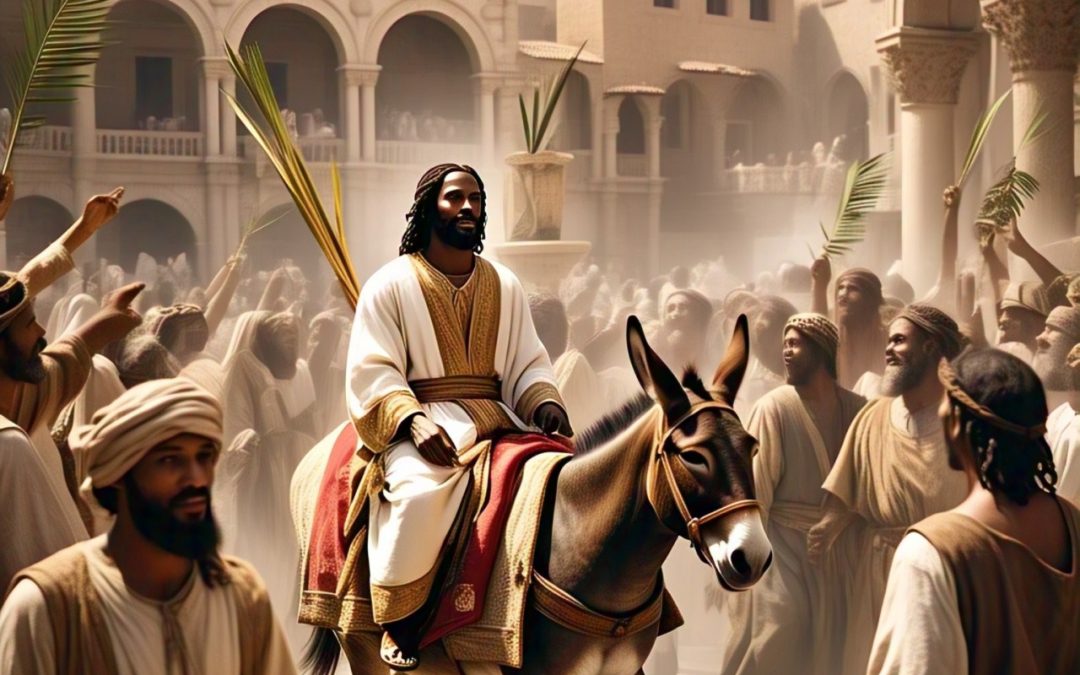Palm Sunday marks the triumphal entry of Jesus into Jerusalem, an event recorded in all four Gospels. As Jesus rode into the city on a donkey, crowds spread palm branches and garments on the road, shouting “Hosanna!” and welcoming Him as the long-awaited Messiah. This moment of jubilation inaugurates Holy Week and sets in motion the events leading to Christ’s passion and resurrection.
Palm Sunday embodies a stark paradox—a triumph that leads to apparent defeat before culminating in ultimate victory. Jesus enters Jerusalem not as a conquering military leader on a warhorse but mounted on a donkey, fulfilling Zechariah’s prophecy: “See, Your king comes to You, righteous and victorious, lowly and riding on a donkey” (Zechariah 9:9). This deliberate choice reveals Christ’s kingdom as one established through humility and peace rather than dominance and violence.
The palms themselves carry rich symbolism. In ancient tradition, palm branches represented victory and were used to welcome returning conquerors. Yet here, they herald a victory that will come through surrender, a conquest achieved through sacrifice. The crowds’ acclamation of “Hosanna” (meaning “save now”) takes on multilayered significance—a plea Jesus will answer, but in ways radically different from their expectations.
Perhaps most striking is the fickle nature of human acclaim revealed in this narrative. Similar crowds that shout “Hosanna!” will, within days, cry “Crucify Him!” This dramatic reversal illuminates the fragility of popularity and the depth of Christ’s commitment to divine purpose rather than public approval.
Palm Sunday offers a powerful critique of triumphalism and superficial faith. It challenges communities to examine whether they seek a Messiah who conforms to their expectations or are willing to follow Christ’s counterintuitive path of servant leadership and sacrificial love.
The reenactment of the palm procession invites contemporary believers into an embodied practice of discipleship, physically moving behind Christ, allowing our bodies to enact what our hearts must learn. As we wave palms and sing “Hosanna,” we participate in a tradition that simultaneously celebrates Christ’s kingship while acknowledging that His throne is the cross.
In our polarized society, Palm Sunday offers wisdom about the nature of true leadership and lasting change. Jesus’ entry models authority exercised through humility rather than force, influence wielded through service rather than dominance. This vision challenges political and cultural systems built on power over others rather than power with and for others.
Jesus’ biblical narrative also speaks to our media-saturated culture’s tendency toward momentary enthusiasm without sustained commitment. It reminds us that meaningful transformation, whether personal, communal, or societal—requires moving beyond symbolic gestures to the difficult work of following Christ’s example, even when the path leads through suffering toward new life.
Prayer
King of Peace who rides on a donkey, as we raise our palms and sing our praise, align our hearts with Your humble way.
When we seek triumph without sacrifice, when we desire crowns without crosses, remind us of Your paradoxical path—That true victory comes through surrender, that authentic power flows from service, that lasting change emerges from love.
Guard us from fleeting enthusiasm, from “Hosannas” quickly forgotten. Instead, grant us courage to follow You through this Holy Week’s unfolding drama, from triumph to table, from garden to trial, from cross to tomb to resurrection dawn.
Shape us into disciples whose praise endures, whose commitment transcends circumstance, whose lives proclaim Your kingdom Not merely with waving branches, but with hands extended in justice and compassion, with feet that walk steadfastly in Your way.
Hosanna in the highest! Blessed is the One who comes in the name of the Lord!
Amen.


Recent Comments